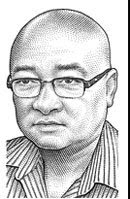DYING IS HARD. COMEDY IS HARDER.What a great piece. It refrains from any oozing sentimentality and captures some sincere peer-to-peer reverence, which in my book is pretty much the best kind. Best of all, the article itself is structured like a great stand-up joke: a throwaway anecdote ends up the basis for the punchline at the end.
June 24, 2008
By Jerry Seinfeld
The honest truth is, for a comedian, even death is just a premise to make jokes about. I know this because I was on the phone with George Carlin nine days ago and we were making some death jokes. We were talking about Tim Russert and Bo Diddley and George said: “I feel safe for a while. There will probably be a break before they come after the next one. I always like to fly on an airline right after they’ve had a crash. It improves your odds.”
I called him to compliment him on his most recent special on HBO. Seventy years old and he cranks out another hour of great new stuff. He was in a hotel room in Las Vegas getting ready for his show. He was a monster.
You could certainly say that George downright invented modern American stand-up comedy in many ways. Every comedian does a little George. I couldn’t even count the number of times I’ve been standing around with some comedians and someone talks about some idea for a joke and another comedian would say, “Carlin does it.” I’ve heard it my whole career: “Carlin does it,” “Carlin already did it,” “Carlin did it eight years ago.”
And he didn’t just “do” it. He worked over an idea like a diamond cutter with facets and angles and refractions of light. He made you sorry you ever thought you wanted to be a comedian. He was like a train hobo with a chicken bone. When he was done there was nothing left for anybody.
But his brilliance fathered dozens of great comedians. I personally never cared about “Seven Words You Can Never Say on Television,” or “FM & AM.” To me, everything he did just had this gleaming wonderful precision and originality. I became obsessed with him in the ’60s. As a kid it seemed like the whole world was funny because of George Carlin. His performing voice, even laced with profanity, always sounded as if he were trying to amuse a child. It was like the naughtiest, most fun grown-up you ever met was reading you a bedtime story.
I know George didn’t believe in heaven or hell. Like death, they were just more comedy premises. And it just makes me even sadder to think that when I reach my own end, whatever tumbling cataclysmic vortex of existence I’m spinning through, in that moment I will still have to think, “Carlin already did it.”
I wonder if there is a term for this type of joke set-up already, like Hitchcock's MacGuffin. If not, I'm ready to coin one: the sleight-of-hand execution reminds me of Rowena Ravenclaw's diadem in the Harry Potter books. In Half-Blood Prince, Harry runs across the "discolored tiara" when he's hiding his Potions book from Snape. And, of course, that old trinket ends up being pretty important by the time we get to Deathly Hallows.
Well diademed, Mr. Seinfeld. And happy travels, George.





